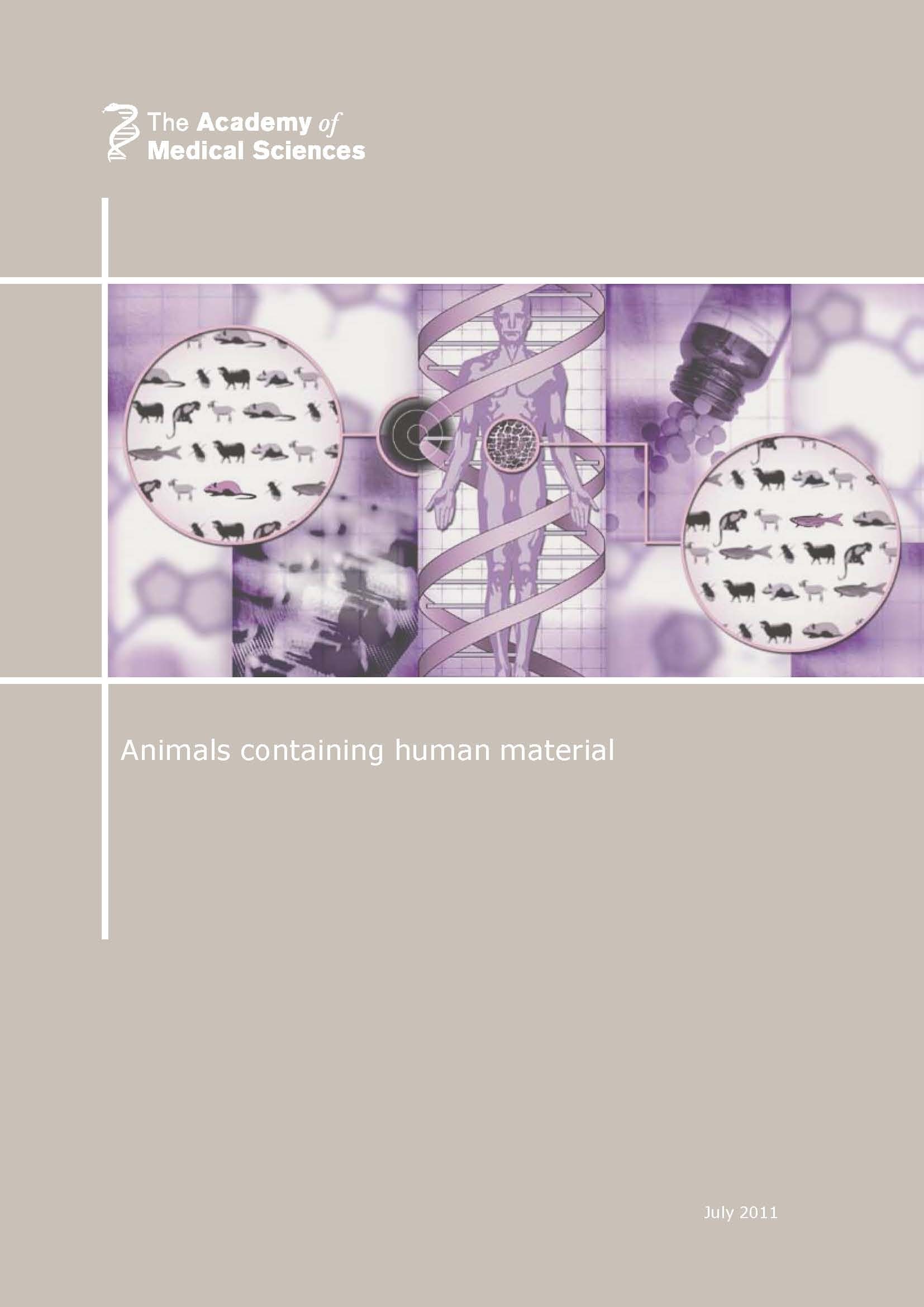Animals containing human tissues, cells or genetic information are used to refine research methods, creating animal models that better represent human disease, and to develop and produce new therapeutics. The study examined the scientific, social, ethical, safety and regulatory aspects of research involving animals containing human material. The report proposes that experiments involving such animals should be classified into three categories, to help determine the level of regulatory scrutiny to which they should be subject. Amongst its recommendations are that:
- The Home Office ensures that a national expert body with a duty to advise on the use of animals containing human material in research is put in place.
- The Home Office and the Department of Health work closely together, and with other bodies where appropriate, to ensure that there are no regulatory gaps, overlaps or inconsistencies in regulation.
- The UK should lead in raising international awareness of animals containing human material, promoting international consistency in research practice involving their use, and exploring the development of international standards or guidance.
Evidence gathered to aid the working group included oral evidence sessions and correspondence with the working group, an open call for evidence and a programme of public dialogue with an associated evaluation.
As recommended in our report, the Home Office has appointed a national expert body that will advise on ACHM research. This function will be assumed by the Animals in Science Committee, which already provides impartial and objective advice to the Home Office on the regulation of animal research. The Home Office has also adopted our recommended classification of ACHM research into three categories of regulation:
- Experiments which do not present issues beyond those of the general use of animals in research and should be carried out under the normal regulatory structures that govern other non-ACHM animal research.
- Experiments which are permissible, pending specialist review by the Animals in Science Committee as the national expert body.
- A narrow range of experiments that should not be licensed due to lack of scientific justification or very strong ethical concerns.
We will continue to work with partners to ensure awareness of ACHM research, consistency in research practice, and the development of appropriate standards or guidance.
Professor Martin Bobrow CBE FRS FMedSci (Chair)
Professor Emeritus of Medical Genetics, University of Cambridge
Professor Thomas Baldwin
Professor of Philosophy, University of York
Reverend Dr Michael Banner
Dean of Trinity College, University of Cambridge
Professor Peter Brophy FRSE FMedSci
Professor of Anatomy, University of Edinburgh
Ms Tara Camm
General Counsel and Company Secretary, Plan International
Professor Dame Kay Davies DBE CBE FRS FMedSci
Lee's Professor of Anatomy, University of Oxford
Professor John Harris FMedSci
Lord Alliance Professor of Bioethics, University of Manchester
Professor Roger Lemon FMedSci
Sobell Chair of Neurophysiology, UCL
Dr Robin Lovell-Badge FRS FMedSci
Head of Division of Stem Cell Biology and Developmental Genetics, MRC NIMR
Professor Jack Price
Professor of Developmental Neurobiology, King’s College London
Professor Terence Rabbitts FRS FMedSci
Director, Leeds Institute of Molecular Medicine
Professor Martin Raff CBE FRS FMedSci
Emeritus Professor, MRC Laboratory for Molecular Cell Biology, UCL
Professor Trevor Robbins FRS FMedSci
Professor of Cognitive Neuroscience, University of Cambridge
Professor Nikolas Rose
Martin White Professor of Sociology, LSE
Professor Christopher Shaw FMedSci
Professor of Neurology and Neurogenetics, King’s College London
Professor Veronica van Heyningen CBE FRS FRSE FMedSci
Group Leader/Joint Section Head, Medical and Developmental Genetics Section, MRC Human Genetics Unit, Edinburgh
Professor Ronald Laskey CBE FRS FMedSci (Chair)
Emeritus Professor of Embryology, University of Cambridge
Professor Sir Richard Gardner FRS
Emeritus Professor, Department of Biology, University of York
Lord Richard Harries of Pentregarth FMedSci
Former Bishop of Oxford
Dr Stephen Inglis
Director of the National Institute for Biological Standards and Control (NIBSC)
Professor Ian Kimber
Chair, Board of National Centre for the Replacement, Refinement and Reduction of Animals in Research (NC3Rs)
Professor Ian McConnell FRSE FMedSci
Emeritus Professor of Veterinary Science, Department of Veterinary Medicine, University of Cambridge
Dr Paul Whiting
Head of Molecular and Cellular Biology and Site Head, Regenerative Medicine, Pfizer
This public dialogue is now closed. For more information about the Academy's public engagement work, please visit our "Encouraging dialogue" section.
The Academy commissioned the ‘Exploring the Boundaries’ public dialogue programme to inform its working group study, ensuring this work is informed by public opinion alongside that of scientists and other experts.
Ipsos MORI, one of the UK’s leading research agencies, worked with the British Science Association and the public engagement specialists Dialogue by Design to deliver the dialogue, which was supported bySciencewise-ERC.
The dialogue included a series of deliberative workshops, focus groups, and interviews, as well as a nationally representative public survey.
The Academy commissioned an independent evaluation of the dialogue programme, which was carried out by Laura Grant Associates.
The evaluation provides an independent assessment of the dialogue programme’s credibility, effectiveness and success. It also identifies learning to support the development of good practice in public dialogue.
The evaluation reflected on the success of the programme in providing a route to elicit societal and ethical attitudes towards this challenging area of research.
An
independent evaluation reflected on the success of
the programme, in providing a route to elicit societal
and ethical attitudes towards this challenging area
of research.

